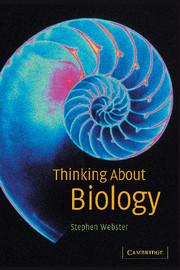2 - Reductionism
Published online by Cambridge University Press: 24 May 2010
Summary
An introduction
Biology is the study of living things. Its domain is life. Biologists inquire into the way things crawl or jump; they study how one generation makes the next, or how animals breathe and find their food. In short, biology asks questions about organisms. It explains how living things grow, reproduce and die.
Through this image of biology, we see the planet earth as populated by millions of kinds of living things, purposefully going about their business, with biologists meanwhile trying to fathom why they do the things they do. It is the biology of wildlife television programmes in the tradition of David Attenborough, of whales and lions, orchids and Venus flytraps, rock pools and mountain eyries. If for school students biology sometimes shines over physics and chemistry it is because the subject is about something ‘real’ – the human body, or animals, or plants. The idea lasts: many working biologists describe their initiating experience as a powerful encounter with living things close-up, with insects or Californian redwoods or sea anemones. No doubt these formative influences run deep in most biologists, so it is interesting to investigate how far the reality of modern biology matches up to our first hopes of the subject. A casual look at any general textbook, or course synopsis, provokes the feeling that biology is not, after all, about living things. Instead of animals and plants – or fungi or protoctists or prokaryotes – we see molecules, organelles and enzyme pathways.
- Type
- Chapter
- Information
- Thinking about Biology , pp. 38 - 66Publisher: Cambridge University PressPrint publication year: 2003



